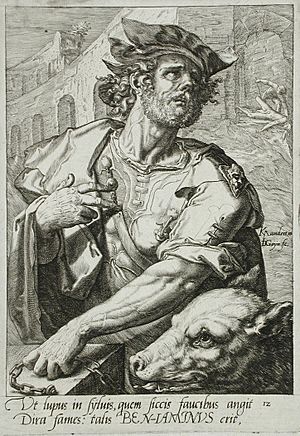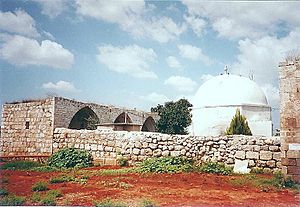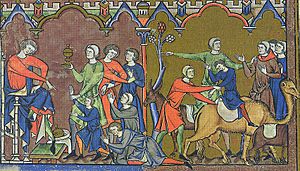Benjamin facts for kids
Quick facts for kids
Benjamin
|
|
|---|---|
| בִּנְיָמִין | |
 |
|
| Pronunciation | Biniamin |
| Born | 11 Cheshvan |
| Children |
|
| Parents | |
| Relatives | |
Benjamin (Hebrew: בִּנְיָמִין, Bīnyāmīn, "Son of the right side") was a very important person in ancient history. He was the youngest of Jacob's thirteen children. Jacob had twelve sons and one daughter. Benjamin was also the second and last son of Rachel, Jacob's favorite wife.
Benjamin's story is found in Jewish, Christian, and Islamic traditions. He became the ancestor of the Tribe of Benjamin, one of the twelve Israelite tribes. Unlike his older brother Joseph, Benjamin was born in Canaan. This was the land that God promised to Jacob's family.
In the Samaritan Pentateuch, Benjamin's name is "Binyaamem," which means "Son of my days." The Quran also mentions Benjamin. It describes him as a good young child who stayed with Jacob. This happened when his older brothers were plotting against Joseph. Later Jewish writings say Benjamin was one of four ancient Israelites who lived without sin.
Contents
Understanding Benjamin's Name
Benjamin's name has an interesting history. It is first seen in old letters from King Sîn-kāšid of Uruk. This king lived around 1800 BC. He called himself "King of Amnanum." He was part of a group called the "Binu-Jamina." This name means "Sons of the South." It is connected to the name "Benjamin" we know today.
In the Hebrew Bible, Benjamin's name was first "Benoni." This name meant "son of my pain." His mother, Rachel, gave him this name because she was dying after giving birth. But his father, Jacob, changed it to Benjamin. This new name means "son of the right side" or "son of the south."
Some old Jewish teachers, like Rashi, gave different meanings for Benjamin's name. One idea is "son of the south." This is because he was born in Canaan, which was south of where Jacob's other sons were born. Another idea is "son of days." This means he was born when Jacob was very old. The Samaritan Pentateuch spells his name "Binyamim." This spelling also suggests he was born when Jacob was old.
Benjamin was born after his mother, Rachel, had prayed and fasted for a long time. Jacob was over 100 years old when Benjamin was born. In most Bible stories, Benjamin is shown as a young child. But at one point, the Bible says he had ten sons. This part might come from a different, later source.
Today, in French and Spanish, the word "Benjamin" is used to mean the youngest child in a family. It often refers to a child who is especially loved.
Benjamin and Joseph in Egypt

The Bible tells a famous story about Joseph and his brothers. Joseph was Benjamin's older brother, also born to Rachel. Joseph's brothers had sold him into slavery many years before. Later, Joseph became a powerful leader in Egypt. His brothers came to Egypt to buy food during a famine. They did not know Joseph was the leader.
Joseph decided to test his brothers. He secretly put a silver cup in Benjamin's bag. Then, he had his servants search the bags. When the cup was "found" in Benjamin's bag, Joseph demanded that Benjamin become his slave.
Judah, one of Benjamin's older half-brothers, begged Joseph not to enslave Benjamin. Judah explained that losing Benjamin would break their father Jacob's heart. This act of love and loyalty from Judah deeply moved Joseph. He then revealed his true identity to his brothers.
Before this test, Joseph had invited his brothers to a feast. The Bible says Joseph showed special favor to Benjamin. He cried when he saw Benjamin and gave him five times more food than the others. This shows how much Joseph loved his full-brother, Benjamin.
The Tribe of Benjamin

Benjamin was the ancestor of the Tribe of Benjamin. This tribe was one of the twelve tribes of Israel. Some experts believe that the tribes of Ephraim, Manasseh, and Benjamin were once considered one large group, the "Joseph" tribe. They think Benjamin later became a separate tribe.
Some scholars also believe that the Joseph tribes, including Benjamin, were the only Israelites who went to Egypt and then returned during the Exodus. They think other Israelite tribes might have stayed in Canaan all along. The story of Jacob visiting Laban to find a wife might be a way to explain this journey. It could show how the Joseph tribes grew strong and wealthy by the time they returned from Egypt.
Benjamin's Sons
The Bible lists Benjamin as having ten sons: Bela, Becher, Ashbel, Gera, Naaman, Ehi, Rosh, Muppim, Huppim, and Ard. The Bible does not mention his wives. However, other ancient books, like the Book of Jubilees and the Book of Jasher, name his wives.
Old Jewish traditions say that Benjamin named each of his sons to honor his brother Joseph.
- Bela (meaning swallow) was named because Joseph seemed to disappear or be "swallowed up."
- Becher (meaning first born) honored Joseph as Rachel's first child.
- Ashbel (meaning capture) remembered Joseph's time in captivity.
- Gera (meaning grain) referred to Joseph living in a foreign land like Egypt.
- Naaman (meaning grace) was for Joseph's kind and graceful way of speaking.
- Ehi (meaning my brother) showed that Joseph was Benjamin's only full-brother.
- Rosh (meaning elder) meant Joseph was older than Benjamin.
- Muppim (meaning double mouth) referred to Joseph sharing what Jacob had taught him.
- Huppim (meaning marriage canopies) was for Joseph getting married in Egypt.
- Ard (meaning wanderer or fugitive) was because Joseph was like a beautiful rose.
There are slight differences in the lists of Benjamin's sons in different parts of the Bible. But these lists show how important his family was in forming the tribes of Israel.
Benjamin in Islam
In the Quran, Benjamin (called Benyamýn in Arabic) is not named directly. However, he is mentioned as the good youngest son of Yaqub. This is part of the story of Yusuf (Joseph). Like in Jewish tradition, Islamic stories also connect the names of Benjamin's children to Joseph.
Family tree
| Terah | |||||||||||||||||||||||||||||||||||||||||||||||||||||||||
| Sarah | Abraham | Hagar | Haran | ||||||||||||||||||||||||||||||||||||||||||||||||||||||
| Nahor | |||||||||||||||||||||||||||||||||||||||||||||||||||||||||
| Ishmael | Milcah | Lot | Iscah | ||||||||||||||||||||||||||||||||||||||||||||||||||||||
| Ishmaelites | 7 sons | Bethuel | 1st daughter | 2nd daughter | |||||||||||||||||||||||||||||||||||||||||||||||||||||
| Isaac | Rebecca | Laban | Moabites | Ammonites | |||||||||||||||||||||||||||||||||||||||||||||||||||||
| Esau | Jacob | Rachel | |||||||||||||||||||||||||||||||||||||||||||||||||||||||
| Bilhah | |||||||||||||||||||||||||||||||||||||||||||||||||||||||||
| Edomites | Zilpah | ||||||||||||||||||||||||||||||||||||||||||||||||||||||||
| Leah | |||||||||||||||||||||||||||||||||||||||||||||||||||||||||
| 1. Reuben 2. Simeon 3. Levi 4. Judah 9. Issachar 10. Zebulun Dinah (daughter) |
7. Gad 8. Asher |
5. Dan 6. Naphtali |
11. Joseph 12. Benjamin |
||||||||||||||||||||||||||||||||||||||||||||||||||||||
Images for kids
See also
 In Spanish: Benjamín para niños
In Spanish: Benjamín para niños
 | James B. Knighten |
 | Azellia White |
 | Willa Brown |






